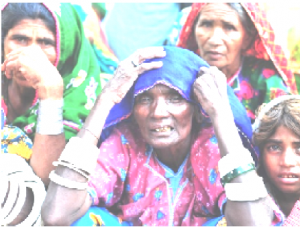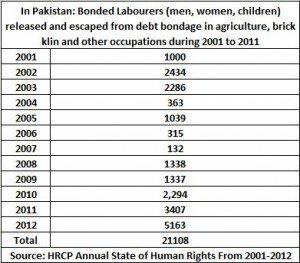 The Constitution of Pakistan in Article 11 states that (1) Slavery is non-existent and forbidden and no law shall permit or facilitate its introduction into Pakistan in any form; (2) All forms of forced labour and traffic in human beings are prohibited; (3) No child below the age of fourteen years shall be engaged in any factory or mine or any other hazardous employment. In 992, the Bonded Labour (Abolition) System Act (BLASA), 1992, was enacted and in 1995, its Rules were formulated, and in 2002 the Prevention and Control of Human Trafficking Ordinance was enacted but unfortunately neither the BLASA nor the constitutional guarantees have brought any justice in the lives of millions of haris (share croppers), bonded labourers, forced labourers, child domestic labourers, slaves in mines and factories, women domestic servitudes, and victims of human trafficking and forced marriages. They are victims of sheer physical and psychological abuse and economic exploitation. There is surge in cases of people including bonded labourers who are selling their kidneys, other organs and their children in a desperate bid to pay off debts. In 2003, in one of the districts of Punjab, about 300 bonded labourers had sold their kidneys to pay off their debts.
The Constitution of Pakistan in Article 11 states that (1) Slavery is non-existent and forbidden and no law shall permit or facilitate its introduction into Pakistan in any form; (2) All forms of forced labour and traffic in human beings are prohibited; (3) No child below the age of fourteen years shall be engaged in any factory or mine or any other hazardous employment. In 992, the Bonded Labour (Abolition) System Act (BLASA), 1992, was enacted and in 1995, its Rules were formulated, and in 2002 the Prevention and Control of Human Trafficking Ordinance was enacted but unfortunately neither the BLASA nor the constitutional guarantees have brought any justice in the lives of millions of haris (share croppers), bonded labourers, forced labourers, child domestic labourers, slaves in mines and factories, women domestic servitudes, and victims of human trafficking and forced marriages. They are victims of sheer physical and psychological abuse and economic exploitation. There is surge in cases of people including bonded labourers who are selling their kidneys, other organs and their children in a desperate bid to pay off debts. In 2003, in one of the districts of Punjab, about 300 bonded labourers had sold their kidneys to pay off their debts.
There are various CSOs in Pakistan that claim to be suporter of bonded labourers and thier families in their release from the captivity of masters/landlords. Some estimate that millions of bonded labourers have been released. There is no record of such interventions. However, in the HRCP’s annual reports, there are recorded 21108 bonded labourers and their families released from the captivity.
With the increasing population, unemployment, poverty, war, natural and human-made emergencies, there has been greater chances of increased in the number of bonded labourers in comparison to studies conducted a decade ago which recorded about 17 million bonded labourers only in agriculture sector. There are reported to more than 13,000 brick kilns in the country which employed about one million labourers, including women and children. Majority of them were bonded labourers through an illegal advance payment system.
In 2001, there were reported about 200,000 women trafficked to Pakistan from Bangladesh, Nepal, Burma. These women were used as sex workers or as bonded labourers. It is being feared that the number of women trafficked have increased due to poverty and no respects of human beings mainly of women being.
In Pakistan, there are estimated about 12 million women including under-age girls all over Pakistan as domestic servants and 264,000 estimated to be child domestic workers working in hazardous and deplorable conditions. In 2010 and 2011, newspapers reported about 18 cases of severe torture and abuse of child domestic workers, of which about 13 children were reported dead due to direct result of violence inflicted on them by their employers.

A majority of bonded or forced labourers in Pakistan belong to religious, low-caste minorities, and low income and disadvantaged groups. These are easy to be sold and bought by employers (please see more details in our policy paper).
Objectives
The ISJ’s have three objectives linked with the main goal of ‘abolition of slavery’. These are:
-Implementation of existing laws and amendment of laws to introduce stringent and mandatory provisions against all forms, types, kinds and levels of slavery;
-Establishment of independent monitoring institutions which could effective ensures monitoring of the implementation of anti slavery laws;
-Re-activate the dead issue of slavery which has been dead for a couple of years;
Strategies
In order to achieve three objectives, the ISJ aims to:
-Help slave people through legal and knowledge based support;
-Raise mass awareness though campaigns, i.e. letter, postcard and signature, media;
-Train, educate and sensitize judges, police officials and employers/landlords;
-Review laws and propose amendments to fill gaps in laws
-Take legal and other possible actions against reported cases of various forms and types of slaveries;
-Conduct fact findings of potential areas of slave trade and other associated activities.




